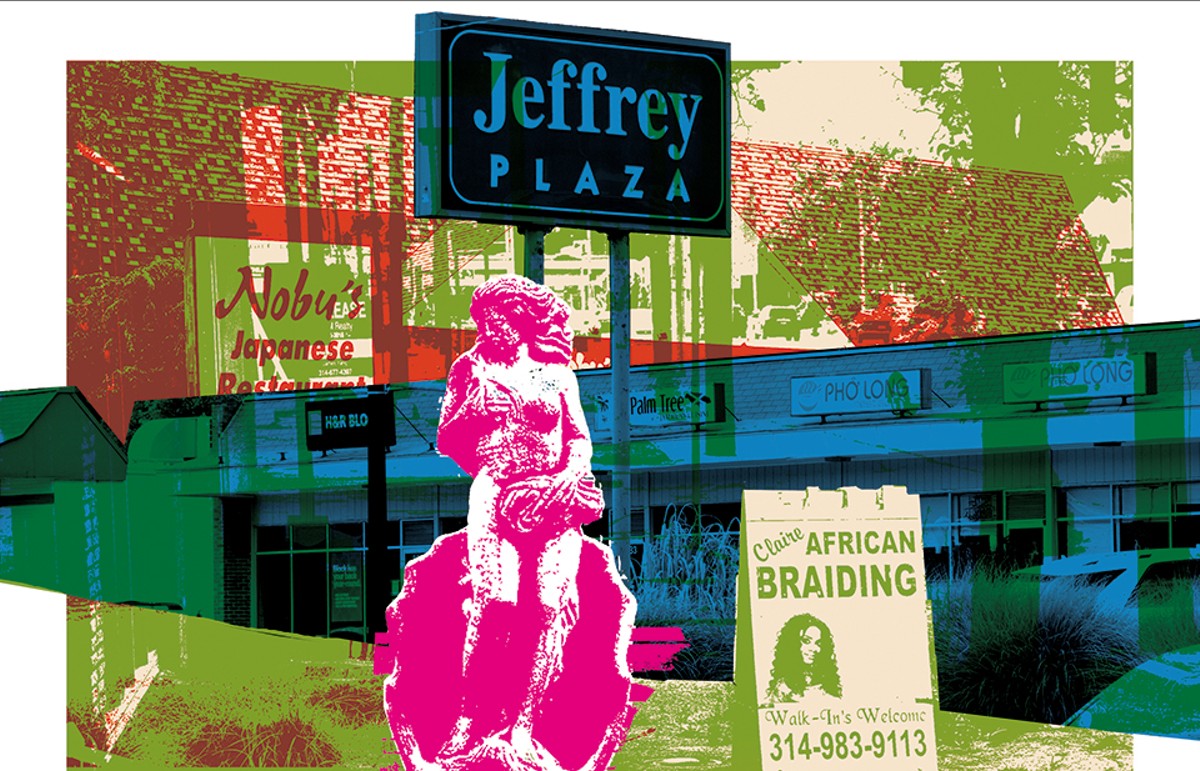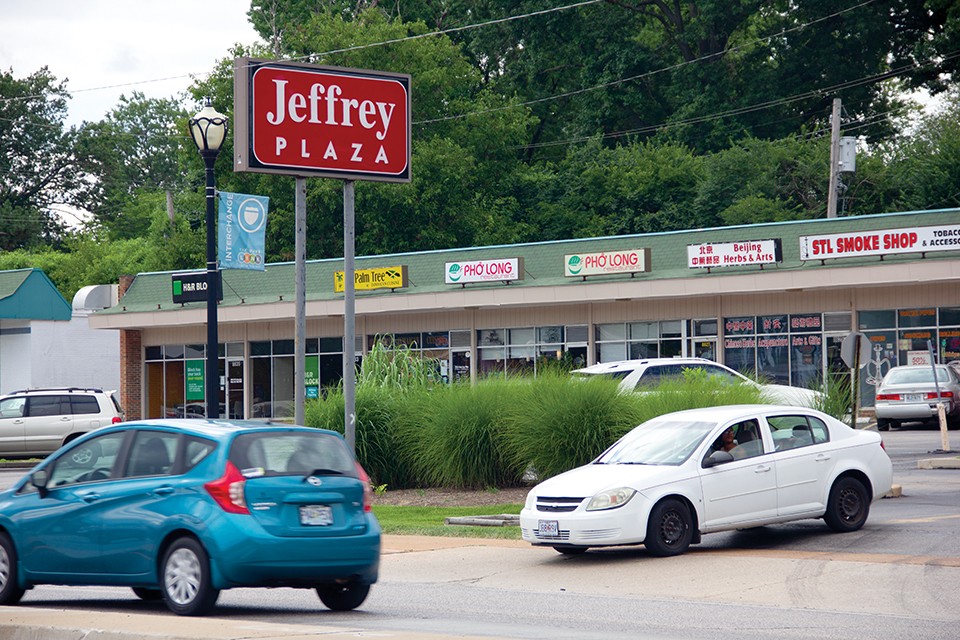
In January 2019, University City released its proposed redevelopment agreement with Novus, seemingly setting up the final steps before its approval by the city council. At this point, however, a retired engineer threw a wrench into things.
"When the plan came out, and I read it, and some things you gotta knock your head against the wall twenty times before you notice something," says Gregory Pace, a University City resident and self-described gadfly. "I got to the city revenues, and I saw the numbers were huge."
The numbers had come from PGAV Planners, a consulting firm hired by the city, and which had previously worked with Novus on multiple projects (including the disaster in Sunset Hills). PGAV's report, issued that summer, showed Costco's first year of projected operations as coming in 2020, with the countywide sales tax revenue for those properties in University City leaping year-over-year from $58,000 to a whopping $517,000.
Eventually (presumably on his 21st re-re-reread) Pace spotted the error.
"I went 'Oh my god!'" he says, "They thought we're a point-of-sale city and that we're going to keep 85 percent of the sales tax!"
Here's what happened: PGAV calculated the projected sales tax revenue of the project over the next two decades, but got one key piece wrong. In reality, University City is a "pool city," in that it, along with some other municipalities in St. Louis County, contributes 100 percent of their local sales taxes into a shared, countywide tax pool. In return, the county distributes the revenue to the pool members based on population. (It's a good deal for the densely populated University City, which gets more out of the pool than it puts in.)
But when PGAV ran the numbers, it presumed University City wasn't a pool city, but a point-of-sale city that keeps most of its sales tax revenue at the outset. It wasn't a small mix-up. When Pace ran the corrected numbers through the project's two-decade lifespan, the revenue came out reduced by more than $20 million.
David Harris, a real estate attorney and University City resident, compiled the updated financial tables and brought them to a city council meeting on January 14. By the end of the month, the council's planned vote to finalize the project had been delayed, and its fate — and the promised $15 million for Ward 3 — hung in the balance.
"The error blew a hole in all those calculations," Harris says.
It was the sort of mistake that, perhaps, Novus and the consultant PGAV would be expected to avoid. After all, during the Sunset Hills debacle, in which Novus had been sued by resident watchdogs, a judge had blasted the insufficient data in the project's cost-benefit analysis, which had been produced for Novus and Sunset Hills by, yes, PGAV.
Now, thirteen years after Sunset Hills, PGAV had (apparently accidentally) given a new city data that wasn't just insufficient, but financially unworkable for everyone. University City's problem was multiplied by its promised benefit agreement for Ward 3. Now, with a giant hole in the city's projected revenue, Harris and others wondered: Where would that $15 million come from now?
The question didn't seem to bother Novus.
"Our end, I will say, is moving forward and fine," Browne told the St. Louis Post-Dispatch after the error was discovered. "All I can say is the request was economically sound a couple of weeks ago. It is not economically sound today without adjustment."
But even before the error was exposed, the development agreement between Novus and University City was already a subject of consternation: Renters and businesses tenants say months passed without updates from Novus. And although city leaders had previously vowed, unequivocally, not to rely on eminent domain in order to clear homeowners from their properties, that portion of the final agreement now included an additional line: "Except as determined by the City Council in its sole and absolute discretion."
To Harris, between the project's clumsy public rollout, the errors in the revenue report and the ambiguity about promised benefits, the situation called for University City to take a stronger role.
That didn't happen.
"There's just something fundamentally wrong about this," Harris says. "It seems to be more to benefit a private developer and Costco, one of the biggest corporations in the country, which gets this huge subsidy to come into the city."
In May, University City and Novus announced a new development agreement — with the most significant changes made to the benefits slated for Ward 3 and the Olive corridor. Now, instead of $7.5 million up front, Novus would chip in just $3 million. Instead of the $500,000 annual payments, Novus would guarantee only up to $200,000 per year. (The remaining money would be filled in by other new taxes and revenue generated on Olive, the city promised.)
On June 10, the University City council unanimously approved the $190 million development deal, complete with $70 million of the city's future taxes and the possibility of eminent domain being wielded by the city council's "sole and absolute discretion."
Harris, though, argues that aside from not making financial sense, the deal presents an impossible scenario for residents. In nearly every way that matters, their future is out of their hands.
"I think about the people who are stuck in the middle," Harris says. "It pits neighbor against neighbor, business against business, tenants against owners. And the city allows it to happen."
At this point, with Novus wrapped in the opaque process of obtaining financing, Harris says University City should be supporting its residents even more, not standing on the sidelines and waiting, like everyone else, for another update from the developer.
"The city is saying, 'This is just between buyers and sellers, we're not involved,' but that's not the way it is," he argues. "The people who put these residents in that situation are the developer and the city. It's put them in a limbo."
On a visit to Jeffrey Plaza in July, there's little evidence of the change in ownership. Still, one shop owner (who asks not to be named) presides over a storewide sale, a sign of his impending move.
"Everybody's lease is up," he says. "They don't know what's going to happen, and they don't know when it's going to happen."
When Novus bought the strip mall in 2018, he explains, tenants found that new leases were being offered only in six-month intervals. It was frustrating for the small businesses of Jeffrey Plaza, but certainly made sense for Novus: The new landlord hoped the strip mall would soon be obliterated to make way for Costco's construction. The stores were just in the way.
By August, the sale is over, and the storeowner's shop is vacated, leaving one less business for Novus to deal with when it's finally time to clear out Jeffrey Plaza. But the owner's summary of the predicament with Novus — no information, no timeline — is echoed the critiques emanating from other small businesses in University City's unofficial Chinatown.
Many of the businesses affected in University City — particularly those run by immigrants and non-native English speakers — had been blindsided by the news, says Caroline Fan, who at the time served as the executive director of Missouri Immigrant and Refugee Advocates. The group arranged for translators and produced Spanish and Chinese versions of the project's documents.
"It's been kind of stunning how bad University City has been in giving businesses any kind of update," Fan says. "It's been a non-transparent, non-respectful process."
And, at least during the initial public hearings, immigrant-owned businesses started speaking out. In a June 2018 interview, a spokesman for the family-run Vietnamese eatery Pho Long, located in Jeffrey Plaza, told RFT contributor Alison Gold that when he reached out to University City, the response was that it was "not feasible" to update business owners directly.
Six months later, when University City Councilwoman Paulette Carr released her scathing newsletter defending the Costco project (while blasting "outside forces" opposing it) she cited a supporter's calculation that it would take "more than 200 Pho Longs to equal the taxable revenue of Costco."
The math is hard to argue with.
For businesses in the redevelopment zone, the writing on the wall is clear. Multiple businesses have left or are in the process of exiting University City. But for property owners like Max Tsai, whose family owns significant chunks of real estate within the proposed development, including an urgent care and grocery, the process has been at a standstill for years.
According to Tsai, Novus first approached him back in 2017, but he was offered only an "option to purchase."
"For us, that didn't make sense," Tsai says. "It wasn't a real negotiation. They're concerned about how much they'll make and not concerned about how much we're going to lose."
Ed Beyers, the owner of Beyers Lumber & Hardware, says the ambiguity has left his business on the chopping block with no apparent solution.
"You can't make any decision, because you don't know what's going to happen," he explains. "It's been that way for a year and a half. I don't care which way it goes, just so they make their damn mind up. I'm sick of it."
Next door to Beyers' business, his longstanding tenant, a BMW repair businesses called Bavarian Inc., has already made contingency plans to leave. In an interview, owner John LaClair confirmed that "we're moving because of" the coming development. LaClair's business, which counts nine employees, has called University City home since 1989.
"If Novus is coming through, they're tearing my building down," he says, adding that he only bought a new location after seeing Novus' first projected timeline, which scheduled demolition to start in November 2018. He doesn't envy the people whose futures remain pinned to Novus' timing.
"Their lives are in limbo," LaClair says, noting that he's already paid $150,000 to prepare the new location, including $12,000 just to reinforce the floors to hold the car lifts.
"I needed to protect my employees," he explains. "If the Costco does improve the area, then fine. If it doesn't, and it all goes to hell, it's a bad thing. I could not go into this unprepared."







